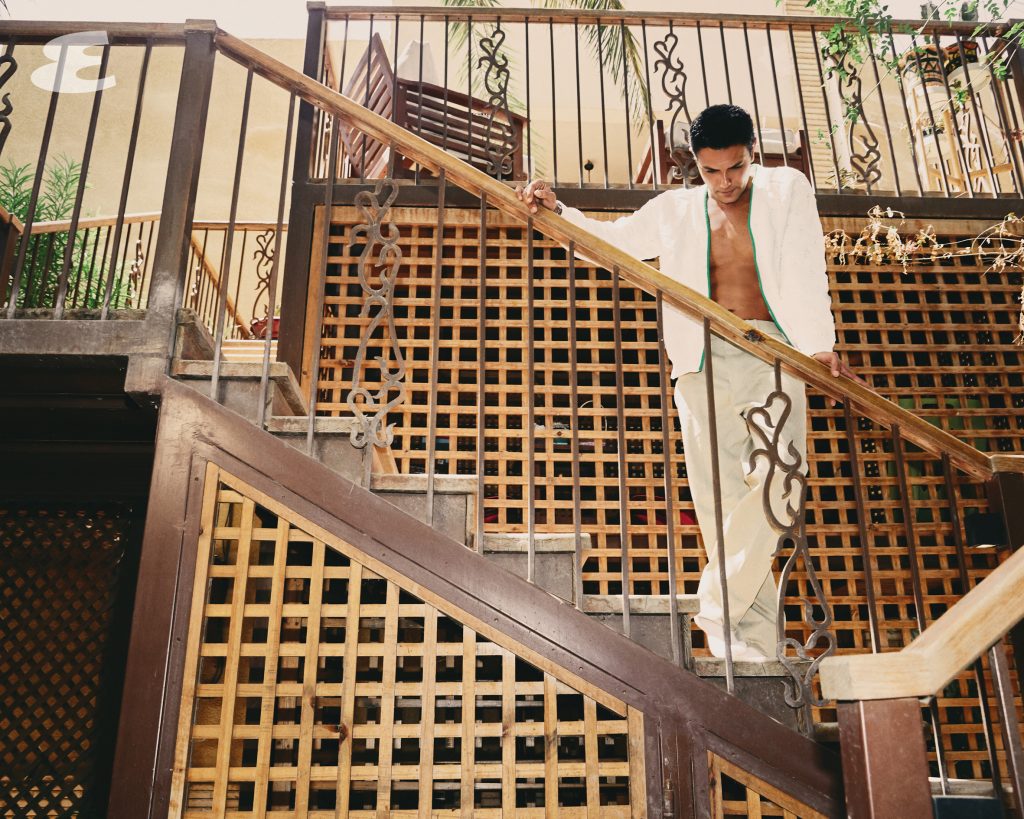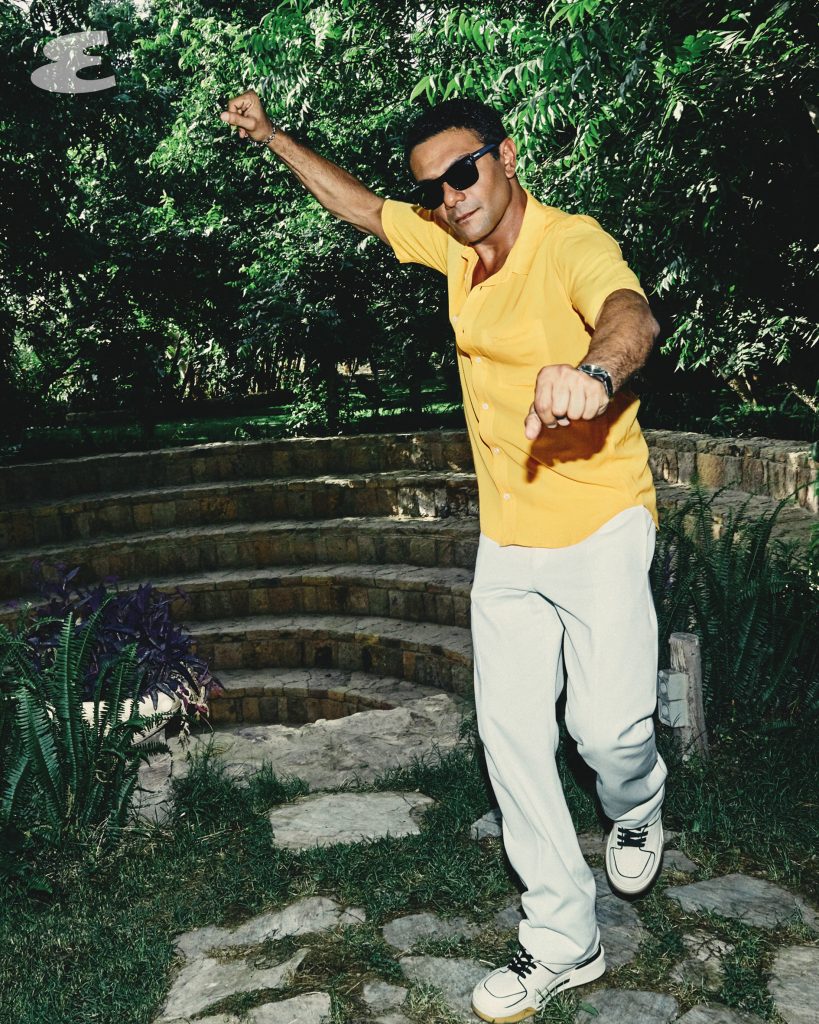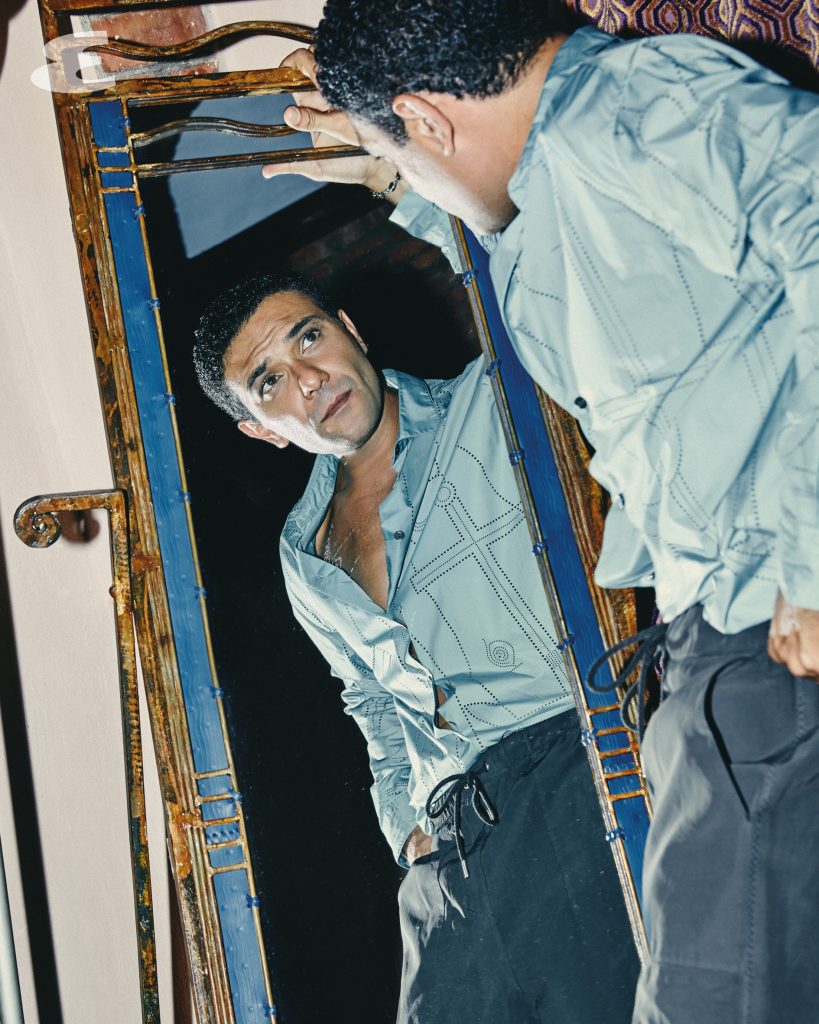After recently tearing it up in the Arabic-version of Suits, a red-hot Asser Yassin is at the peak of his powers. But to truly cement legendary status in the cutthroat world of Egyptian cinema it will take time, work-ethic and family
There’s a saying that Asser Yassin lives by, one deeply rooted in his Islamic faith—if you give in to the flow of things, the flow will take you where you want to go. It’s a philosophy that has guided him towards the man he has become, and the man he always wanted to be—one of Egypt’s most respected actors.
“It started the very moment I decided that I was going to be an actor,” says Yassin.
For the first time in more than a year, Asser Yassin is at rest. He’s home at his villa in Cairo, and as we Zoom the day before his Esquire cover shoot, he’s carrying his laptop around the house, introducing us to two of his sons, Taher and Ameen, as well as his wife Kenzy. They all greet us like they’re being introduced to an old friend. He even goes outside to show us the view of his neighbourhood, peppered with huge villas and lush with greenery.
“That’s not the Cairo you imagined, is it? It’s really gorgeous here,” he says, beaming with pride.

A few weeks before we talk, Yassin finally wrapped a couple of back-to-back marathon shoots, first an action gang epic series called The Eight, followed by the Arabic-language remake of the cult phenomenon Suits, which was one of the most talked-about shows of this year’s prime-time Ramadan TV schedules.
As dedicated to family life as Yassin is, he’s adamant that fatherhood never changed the way he approached his career—he wouldn’t let it. His drive to be the best, to follow the example of not only the best actors in Egypt but in the history of cinema, and to be proud of his achievements in that direction, is, to him, one of the biggest parts of being a good father.
“You have to love yourself to be a good father. I have to actually be happy to fulfill this role in their lives,” he tells us.
“If I don’t follow my convictions, I am going to hate myself and that hate will seep into other parts of my life. How can you have a good relationship with your kids or family if you hate yourself?”
Asser Yassin
Part of that self-love is not only about succeeding on artistic merit, it’s about being a provider for his family. He’s seen too many people let their work ethic drop and their wallet fall open, and watched their careers (and lives) fall into tatters.
“You can be a star today and do only a couple of projects, and then stay home for a year or two, just spending. I’m driven to not only keep working, but also to work carefully. I have to be very conscious about what producer or director I work with. If a project is not going to do anything to further my career; or if it goes against my own taste; or if I don’t follow that path with conviction, I am going to hate myself. If I do something I don’t want to do, or if I don’t think about financial stability, it will seep into other parts of my life, and when you hate yourself, how are you going to have a good relationship with your kids?” Yassin adds.

Yassin has never done anything he didn’t want to do—including take the path his parents wanted him to take.
“My parents are engineers. My brother is an engineer. They invested a lot in our education. I studied to be an engineer too, and they wanted me to go to Proctor & Gamble, or to ExxonMobil, and before I signed the contract approaching graduation, I said no. I had another calling. I wanted to be an actor,” says Yassin.
Barely into his own adulthood, he knew his parents would have a hard time accepting it, but he stood his ground. As strong as he is, however, he knows he might not have made it through that period if it weren’t for his younger brother – likely one of the reasons he now encourages his own sons to have each other’s backs.
“I used to have his back the whole time we were growing up. My brother used to get into a lot of fights. I never fought for myself, it was always for my brother,” says Yassin.
“When I told the family, and everyone started saying how crazy it was that everyone else was progressing and I was staking a step back for absolutely no reason, my brother was there for me. He said, ‘If you believe in it, I believe in you. Whatever you do.’ He was my backbone. I owe this all to him,” Yassin adds.
“I fell into an intense depression, and I didn’t know why. I missed the character. I didn’t know how to close the doors I’d opened. I had to get back into someone who didn’t exist.”
Asser Yassin
Lucky for both of them, Yassin’s brother is no longer the punk kid throwing hands on the streets of Cairo, and doesn’t need the same kinds of favours.
“Now he’s an old, wise man working for P&G for 14 years. He has his own consultancy. He’s contained, white hair, and every time I see him I just look at him like, man, the sh** you got me into. The sh** you got me into!” Yassin shakes his head and laughs.
Yassin’s parents couldn’t entirely blame him for choosing a creative path. After all, his mother was very creative, and the two have very similar characters and personalities. Yassin’s father was humble but contained—the type of guy who knows everything but doesn’t talk much. It took them a few films to accept he was really going to make a go of ‘this acting thing’, but ever since, they’ve been incredibly supportive.
“Actually, my mother even came with me in one of my films to do a cameo. Now she just wrote her first book. She keeps popping from one TV channel to the other. One day she has a book signing in Alexandria, another she’s on the other side of the country. She’s competing with me! It’s like, who’s the star now?” Yassin laughs.

Yassin may be a star, but stardom is never what interested him, particularly. There’s a reason he stresses over an over that his goal was to be an actor, because it’s the artform itself that was his passion.
It comes to little surprise that Yassin is an unabashed cinephile. Our Zoom chat rolls on for a few hours, our conversation often drifting off topic from his life and career and into an unfiltered geeking out over our favourite directors, trading stories and scenes that have affected the way we view film, fist-bumping through the screen when we bring up what makes people like Brian De Palma, Tony Scott or Francis Ford Coppola great.
His love of cinema is discerning but not prejudiced. He professes equal love for the biggest blockbusters—he had just rented out an entire cinema for himself and his friends to watch Top Gun: Maverick the day before—as he does for the art house. He even tells us, off the record, with eyes as big as a little kid meeting Superman, about the time he got to meet the Bosnian-Serbian director Emir Kusturica, who won the Palme d’Or at Cannes for his film Underground back in 1995.
“You have to love yourself to be a good father. I have to actually be happy to fulfill this role in my sons’ lives
Asser Yassin
Part of that journey into becoming a true aesthete of the medium came from the man he considers his second father, the great Egyptian director Khairy Beshara, the man who helped redefine Egyptian realism in the ’80s and made some of the most important films in the country’s history, including The Collar and the Bracelet, Bitter Day, Sweet Day, and Ice Cream in Gleem.
Beshara was one of the first in the industry to see the potential that Yassin had, casting him in his 2005 film Habiba’s Heart, kickstarting a close relationship that continues to this day.
“His son was a friend of mine. We went to the same university. He saw me once in one of his son’s short films, and he said, ‘I want this guy to work with me.’”

“He’s my mentor. He really is my second father. I call him almost every day. He’s one of the most influential people in my life in terms of how I see myself, how I see life, and how I see film,” says Yassin about the 74-year-old icon.
He also credits the director Sherif Arafa with pulling more out of him than he knew was there, helping him become the actor he is today.
“He [Sherif Arafa] doesn’t talk much, but he would cast me among stars and give me huge challenges. Even though my part may have read like not much in the script, he would continue demanding more from me, and it would become something bigger than it was supposed to be. He would keep pushing me when nothing required him to—he just did it,” says Yassin.
Yassin kept pushing himself. Sometimes, he admits, too far.
Yassin is a student of the game, happy to take bits of the techniques of Soviet acting legend Kostantin Stanislavski as he is of American Sanford Meisner.
Twice in his career, he’s went ‘full Method’ – using an acting technique developed from Stanislavski’s teachings in the famed Actor’s Studio in New York, which requires the actor to fully submit themselves to the character, refusing to break character throughout the film’s prep and production. The technique has become almost infamous—Yassin now knows why. He’s done it twice, the last time in the performance he considers his best, from the 2018 film Diamond Dust.

Much like Arafa taught him, he pushed himself into the role far more than anyone required of him.
“The director told me that I have to change. He said, ‘I don’t want you to be charismatic. I don’t want you to be the star. Push that all away.’ And I did. I lost 10kgs. I opened doors inside of myself that I had closed before. I went fully into it. I even spent a year and a half learning to play the drums for maybe 20 seconds of film. It was a major transformation,” says Yassin.
At the premiere, as he watched the film unfold, however, Yassin realized something was very wrong.
“I realized I could relate to him more than I could relate to myself. I couldn’t process it. This guy was there, but I was here—or at least I was supposed to be. So where could I go from here?” he says.
“I fell into an intense depression, and I didn’t know why. I missed the character, I missed the cast, I didn’t know how to close the doors I’d opened there I felt I had to get back into someone who didn’t exist,” he continues.
It took seven months for Yassin to pull himself out of that, relying on medication, intense therapy, and most of all, his family, to help pull him out of it, and bring him back to himself.

“I called my brother, my parents, my kids, my wife, all the time for their help. One of the major grounding techniques I have is them to keep me connected to come back. I totally get artists or actors who abuse a lot of substances, because if you don’t have this cornerstone, that string that keeps you attached to who you are and where you belong to can easily be cut,” says Yassin.
“There are so many performers that have gone beyond what they can withstand. Some of my colleagues died, actually died, because they gave it more than they should have. They just couldn’t get back. I’m lucky I could.”
Yassin has other outlets for his creativity, too, that help him tethered to the reality he’s built for himself. He paints, he sculpts, he writes in journals constantly. He even sold a script that never got made, and directs music videos as well. He’s good at these things, too—he tells us about the painting habit when we point out the impressive artworks that on the walls of his home, only for him to reveal he made them himself.
“I keep surprising myself, and surprising people. It’s like that in my career, too. When you do an action movie, for example, you’re labelled an action star. The next thing you’re offered is action. But I look up to Al Pacino and Tom Hanks. They were never labelled as action stars or comedians, but they do comedy and drama better than anyone. They keep on surprising us. That’s what I want. That’s what I’m following.”
As the last 12 months propelled him to a new level of stardom, Asser Yassin’s intention is clear. From here, he knows that the flow will take him even further. After all, if it’s within your grasp, why try to be anything less than legendary?
See more of Asser Yassin in Esquire Middle East‘s June issue, on newsstands now

Production and Styling: Jody Hassan IG: @JodyHasn
Photography : Amina Zaher IG:@Aminazaher
Production Management: Malak Hossam IG:@malalaalaaa
Creative Direction: Zein Abed IG:@zein.abed
Fashion Coordinator: Aisha Abo Youssef IG:@Aisha.styles
Make up artist: Sara Boulos IG:@sarabouls_makeupartist
Photographer Assistant: Malak El Araby IG:@malakelaraby
Hair Groomer: Ramy Tharwat IG:@Ramy.tharwat88
Production and Fashion Assistant: Omar Bazan IG:@kareenasareena
Location: Nūt Boutique Lodge IG:@nutorabii
